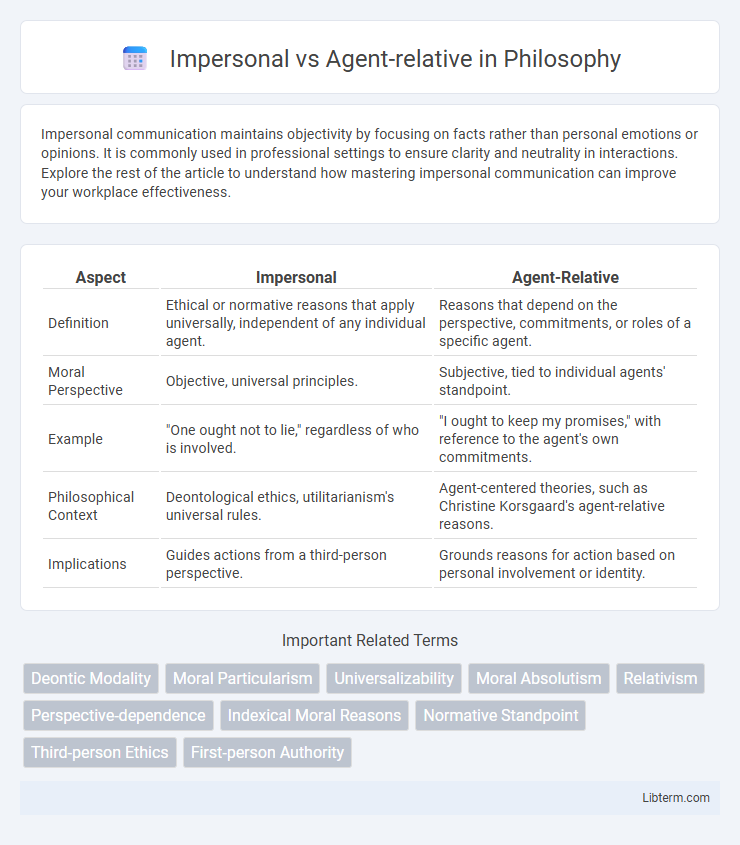Impersonal communication maintains objectivity by focusing on facts rather than personal emotions or opinions. It is commonly used in professional settings to ensure clarity and neutrality in interactions. Explore the rest of the article to understand how mastering impersonal communication can improve your workplace effectiveness.
Table of Comparison
| Aspect | Impersonal | Agent-Relative |
|---|---|---|
| Definition | Ethical or normative reasons that apply universally, independent of any individual agent. | Reasons that depend on the perspective, commitments, or roles of a specific agent. |
| Moral Perspective | Objective, universal principles. | Subjective, tied to individual agents' standpoint. |
| Example | "One ought not to lie," regardless of who is involved. | "I ought to keep my promises," with reference to the agent's own commitments. |
| Philosophical Context | Deontological ethics, utilitarianism's universal rules. | Agent-centered theories, such as Christine Korsgaard's agent-relative reasons. |
| Implications | Guides actions from a third-person perspective. | Grounds reasons for action based on personal involvement or identity. |
Introduction to Impersonal and Agent-relative Perspectives
Impersonal perspectives emphasize actions or events without attributing agency to any specific individual, focusing on general processes or states. Agent-relative perspectives highlight the role, intentions, and responsibilities of specific agents in performing actions or making decisions. Understanding the distinction aids in analyzing linguistic structures and ethical evaluations where agency and responsibility matter.
Defining Impersonal Reasoning
Impersonal reasoning refers to judgments or decisions made without attributing them to a specific agent, focusing on objective principles or universal norms rather than individual perspectives. This contrasts with agent-relative reasoning, which considers the particular interests, responsibilities, or contexts of the individual decision-maker. Defining impersonal reasoning involves emphasizing impartiality and the application of generalizable ethical rules independent of personal stakes or relationships.
Understanding Agent-relative Motivation
Agent-relative motivation involves reasons tied specifically to an individual's personal perspectives, interests, or obligations, distinguishing it from impersonal motivation, which is based on objective or universal criteria. Understanding agent-relative motivation requires analyzing how personal commitments and desires shape moral decisions differently compared to impersonal, impartial considerations. This distinction is crucial in ethical theory, especially in debates on moral responsibility and practical reasoning.
Key Differences Between Impersonal and Agent-relative Ethics
Impersonal ethics emphasize universal moral principles that apply regardless of individual roles, focusing on impartiality and equal consideration of all affected parties. Agent-relative ethics prioritize the moral obligations and responsibilities specific to the agent's personal relationships, commitments, or roles, allowing for exceptions based on the agent's perspective. The key difference lies in impersonal ethics demanding consistent application of rules to all, while agent-relative ethics justify preferential treatment depending on the agent's particular standpoint or connections.
Examples of Impersonal Approaches
Impersonal approaches in linguistics often use constructions that omit a specific agent, such as passive voice or dummy subjects like "it" and "there," exemplified by sentences like "It is believed that climate change affects biodiversity." These forms shift focus from the doer of the action to the action itself or a general state, enabling broader or more objective statements. Impersonal expressions contrast with agent-relative sentences, which explicitly identify the agent, as in "Scientists believe that climate change affects biodiversity.
Cases of Agent-relative Considerations
Agent-relative considerations arise when moral judgments depend on an individual's specific relationship or commitments, highlighting personal responsibilities and permissions distinct from impartial standards. Cases include fiduciary duties where agents must prioritize client interests, or conflicts of interest demanding actions aligned with agent-centered obligations. These scenarios contrast impersonal ethical evaluations by emphasizing subjective perspectives and individual moral authority.
Impacts on Moral Decision-Making
Impersonal moral principles apply universally, emphasizing fairness and equality regardless of individual relationships, which can promote consistent ethical standards in decision-making. Agent-relative reasons prioritize the interests and responsibilities of specific individuals or agents, often leading to moral decisions that reflect personal commitments and contextual factors. The tension between impersonal and agent-relative approaches influences the complexity of moral judgments by balancing objective ethical rules with subjective human connections.
Philosophical Debates: Impersonal vs Agent-relative
Philosophical debates on impersonal versus agent-relative perspectives revolve around the nature of moral reasons and obligations, assessing whether reasons apply universally or depend on the agent's specific standpoint. Impersonal theories argue that moral reasons hold equally for all agents regardless of individual interests, promoting impartiality in ethical decision-making. Agent-relative theories suggest that moral reasons are tied to an individual's personal relationships or commitments, emphasizing context-dependent duties and responsibilities.
Real-world Applications and Challenges
Impersonal language structures facilitate automated systems and AI by minimizing ambiguity in user commands, enhancing efficiency in virtual assistants and chatbots. Agent-relative expressions, crucial in legal and ethical reasoning, require context-sensitive interpretation to assign responsibility accurately, posing challenges in developing neutral AI models. Balancing these approaches in natural language processing improves human-computer interaction while addressing issues of intent recognition and accountability.
Conclusion: Weighing Impersonal and Agent-relative Perspectives
Impersonal perspectives emphasize objective reasoning detached from individual intentions, which enhances universal applicability in ethical and logical analysis. Agent-relative views prioritize the agent's specific motivations and context, offering practical guidance for personal decision-making and moral responsibility. Balancing these approaches provides a comprehensive framework that aligns abstract principles with real-world agent-centered considerations.
Impersonal Infographic

 libterm.com
libterm.com